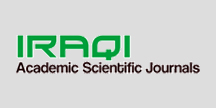The Emergence of Qur’anic Interpretation through Opinion: An Evaluative Study
DOI:
https://doi.org/10.21271/zjhs.24.2.3Keywords:
Interpretation, Opinion, Emergence, Companions (of the Prophet, PBUH), followers of the Companions (May Allah be pleased with them all).Abstract
The present research tackles the emergence of [Qur’anic] interpretation through opinion by the Companions of the Prophet (May Allah be pleased with them, during the Age of the Prophet (Peace be upon him). As the studies that dealt with the approaches of the interpreters divided the interpretation to the two schools: of interpretation through impact, and interpretation trough opinions. They pointed out that the beginning of the advent of interpretation was limited to the interpretation by impact through narration, and that the Companions (May Allah be pleased with them) avoided the interpretation of the Qur'an by their opinion. But it's worth noting that this issue needs to be reviewed.
This research is an attempt to prove and reveal that the signs of interpretation were not limited to the interpretation by impact through narration. Rather, the interpretation was handed down to the Prophet's Companions, as they sometimes interpreted the Qur'an according to their understanding of the verse and the Prophet, peace be upon him did not object to that. Accordingly, I deemed it necessary to examine the emergence of such Qur’anic interpretation, that is, interpretation by opinion; and also to scrutinize and analyze the issue of interpretation; hoping to reach at the conclusion that interpretation by opinion emerged side by side with the interpretation by impact at the age of the Prophet, Peace be upon him. Later, the Qur’anic scholars and interpreters narrated that interpretation and was named ‘interpretation through narration’. But, originally, what was quoted and narrated from our Prophet, peace be upon him, only that is called ‘interpretation through narration’, because everything said by the Prophet, peace be upon him was Revelation [from Allah the Almighty], as the Almighty recites: (Nor does he speak out of desire. (3). Indeed, it is not except a Revelation which is revealed, (4). [Sura 53: AN-NAJM (THE STAR)].
References
- ابن حجر، أحمد بن علي أبو الفضل، (1379هـ)، فتح الباري شرح صحيح البخاري، (د.ط)، بيروت: دار المعرفة.
- ابن عطية، أبو محمد عبد الحق، (1422هـ)، المحرر الوجيز في تفسير الكتاب العزيز، تحقيق: عبد السلام عبد الشافي محمد، (ط1)، بيروت: دار الكتب العلمية.
- ابن منظور، أحمد بن مكرم، (1414ھ)، لسان العرب، ط3، بيروت: دار صادر.
- أبو حيان لأندلسي، محمد بن يوسف (1420ھ)، البحر المحيط في التفسير، تحقيق: صدقي محمد جميل، (د.ط)، بيروت: دار الفكر،.
- أحمد بن حنبل، أبو عبد الله، (2001م)، مسند الإمام أحمد بن حنبل، تحقيق: شعيب الأرنؤوط؛ عادل مرشد، وآخرون، (ط1).
- أيوب، حسن محمد، (2004م)، الحديث في علوم القرآن والحديث، (ط2)، الإسكندرية: دار السلام.
- البخاري، محمد بن إسماعيل، (1422ھ)، المسند الصحيح المختصر من أمور رسول الله (صلى الله عليه وسلم) وسننه وأيامه، تحقيق: محمد زهير بن ناصر الناصر، (د.ط)، دار طوق النجاة.
- الترمذي، محمد بن عيسى، (1998هـ)، سنن الترمذي - الجامع الكبير، (د.ط)، تحقيق: بشار عواد معروف، بيروت: دار الغرب الإسلامي.
- الجوهري، أبو نصر إسماعيل، (1987م)، الصحاح تاج اللغة وصحاح العربية، تحقيق: أحمد عبد الغفور عطار، ط4، بيروت: دار العلم للملاين.
- الحاكم، أبو عبد الله محمد، (1990م)، المستدرك على الصحيحين، (ط1)، تحقيق: مصطفى عبد القادر عطا، بيروت: دار الكتب العلمية.
- الدَّوْرَقي، أبو عبد الله أحمد، (1407هـ)، مسند سعد بن أبي وقاص، (ط1)، تحقيق: عامر حسن صبري، بيروت: دار البشائر الإسلامية.
- البغا؛ ديب مستو، (1998 م)، الواضح في علوم القرآن، (ط2)، دمشق: دار الكلم الطيب؛ دار العلوم الإنسانية.
- الذهبي، (د.س)، محمد السيد حسين، التفسير والمفسرون، (د.ط)، القاهرة: مكتبة وهبة.
- الزُّرْقاني، محمد عبد العظيم، (د. س)، مناهل العرفان في علوم القرآن، (ط3)، بيروت: مطبعة عيسى البابي الحلبي وشركاه.
- الزركشي، أبو عبد الله بدر الدين، (1957م)، البرهان في علوم القرآن، تحقيق: محمد أبو الفضل إبراهيم، (ط1)، بيروت: دار إحياء الكتب العربية عيسى البابى الحلبي وشركائه.
- السيوطي، عبد الرحمن بن أبي بكر، (1974م)، الإتقان في علوم القرآن، تحقيق: محمد أبو الفضل إبراهيم، (ط1)، الهيئة المصرية العامة للكتاب.
- صالح، صبحي، (2000م) مباحث في علوم القرآن، (ط24)، دار العلم للملاين،.
- الطبري، محمد بن جرير، (2000م)، جامع البيان في تأويل آي القرآن، تحقيق: أحمد محمد شاكر، (ط1)، مؤسسة الرسالة.
- الحاجي، محمد، (2007م)، موسوعة التفسير قبل عهد التدوين، (ط1)، دمشق: دار المكتبي.
- الفراهيدي، أبو عبد الرحمن الخليل، (د.س)، كتاب العين، (د.ط)، تحقيق: د. مهدي المخزومي؛ د. إبراهيم السامرائي.
- القزويني، أحمد بن فارس، (1979م)، معجم مقاييس اللغة،(د.ط)، تحقيق: عبد السلام محمد هارون، دار الفكر.
- القِنَّوجي، أبو الطيب محمد، (1992م)، فتحُ البيان في مقاصد القرآن، (د.ط)، بيروت: المكتبة العصرية للطباعة والنشر، صيدا.
- مسلم، أبو الحسن القشيري النيسابوري، (د.س)، المسند الصحيح المختصر بنقل العدل عن العدل إلى رسول الله صلى الله عليه وسلم، (د.ط)، تحقيق: محمد فؤاد عبد الباقي، بيروت: دار إحياء التراث العربي.
- مسلم والسرحان، مساعد آل جعفر؛ محي هلال، (1980م)، مناهج المفسرين، (ط1)، دار المعرفة.
- النقراشي، محمود السيد علي، (1986م)، مناهج المفسرين من العصر الأول إلى العصر الحديث، (ط1)، مكتبة النهضة – القصيم – بريدة.
- ياسين، حكمت بن بشير، (1999م)، موسوعة الصحيح المسبور من التفسير بالمأثور، (ط1)، المدينة المنورة: دار المآثر للنشر والتوزيع والطباعة.
Downloads
Published
How to Cite
Issue
Section
License
Copyright (c) 2024 Zorab Ibrahim Mawlood

This work is licensed under a Creative Commons Attribution 4.0 International License.
Except where otherwise noted, content on this site is licenced
under a Creative Commons Attribution License 4.0 (CC BY- 4.0)









